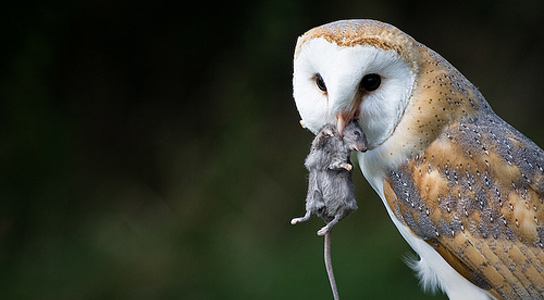
Rodent poisons based on blood thinners accumulate in birds of prey and other animals. Credit: Photo by Dries Gaerdelen
Canada and the US have started to restrict the use of rodent poisons based on blood thinners, as new research shows that the toxins accumulate in birds of prey and other animals.
Anticoagulant rodenticides (ARs) work like the drug Warfarin on humans, which itself was used as a first-generation AR, and was less lethal and less prone to bioaccumulation than its second-generation successors.
Second-generation ARs seem to act like pesticides such as DDT, which build up in animals that prey on target pests. “It seems that every time anybody goes out and gets a bunch of dead birds of prey and looks at their livers, they find surprisingly high incidence of these compounds,” says John Elliott, an ecotoxicologist at Environment Canada in Delta.
In a study of 130 birds of prey found dead near Vancouver, virtually all of them had residues of at least one second-generation AR in their livers. The researchers presented their findings at the 2012 meeting of the North American division of the Society of Environmental Toxicology and Chemistry in Long Beach, California.
Second generation ARs are persistent, bioaccumulative and toxic and may pose a risk for non-predatory birds as well. Other birds can also be poisoned by the insects they eat if those insects have eaten the poisoned rat bait. Some birds may even eat the bait directly.
ARs interfere with the blood’s ability to clot. However, there is a variation in how susceptible individual birds and animals are to these poisons. A similar variation is seen among humans who take blood-thinning drugs.
On January 1, 2013, Canada will start restricting most outdoor household use of ARs to the less toxic first-generation compounds. The bait will have to be contained in tamper-resistant bait stations, in order to be non-accessible to non-target wildlife.
The US EPA is also considering a second-generation AR ban for the consumer market. Potent neurotoxins like bromethalin have been used instead. However, ARs are mostly used by pest-control operators, who leave their products outside for long periods of time, which will increase wildlife exposures.
There is no antidote for bromethalin, meaning that there is a potential risk to children and pets. AR poisoning can be treated using vitamin K.









Be the first to comment on "Blood-Thinning Rodenticide is Killing Birds"